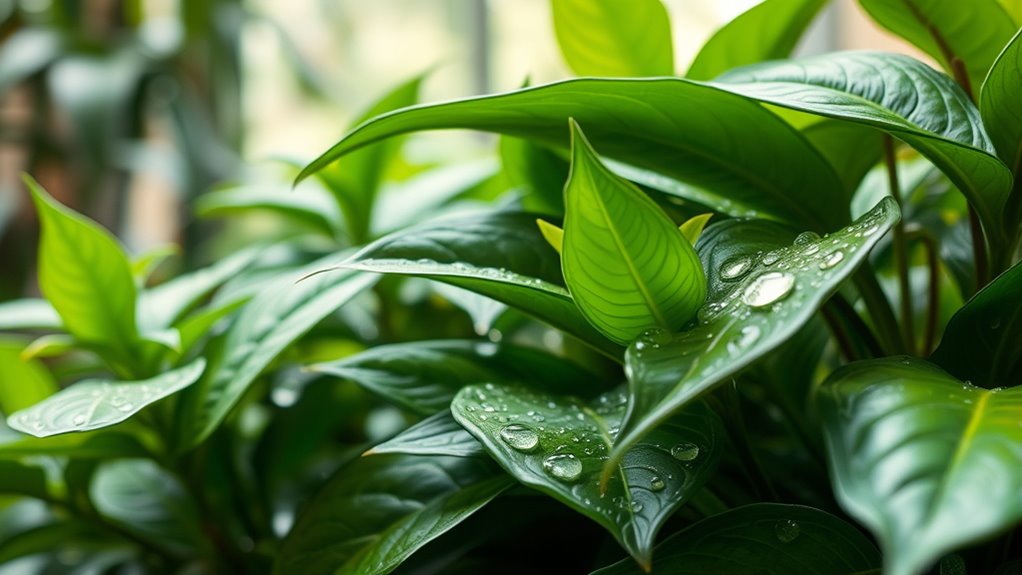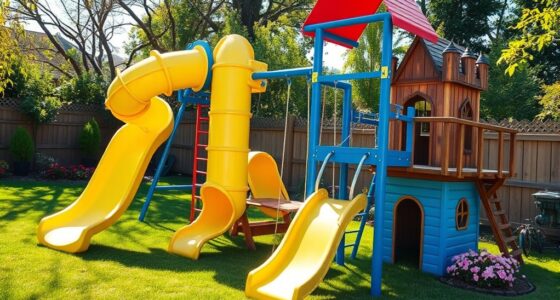If you’re looking for the best insecticidal soaps for houseplants, I recommend options like Garden Safe, NATRIA, and Bonide that kill pests quickly, are easy to apply, and safe for pets and plants. These products target pests such as aphids, mites, and whiteflies, providing effective, eco-friendly relief without harmful residues. To find the most suitable one for your plants and needs, explore the top picks that combine safety, efficiency, and ease of use.
Key Takeaways
- Look for products with natural ingredients like neem oil, garlic oil, or fatty acids for safe, eco-friendly pest control on houseplants.
- Choose ready-to-use sprays that target pests on foliage, undersides of leaves, and soil for comprehensive coverage.
- Prioritize OMRI-listed or USDA organic-certified insecticidal soaps for safe indoor use on edible and delicate houseplants.
- Reapply every 7-14 days or as needed to effectively manage stubborn pests like aphids, mites, and whiteflies.
- Select formulations that are gentle, safe for pets and children, and won’t harm plant foliage or cause leaf burn.
Sevin 100547234 Insect Killer Ready to use 1 Gallon, White Label
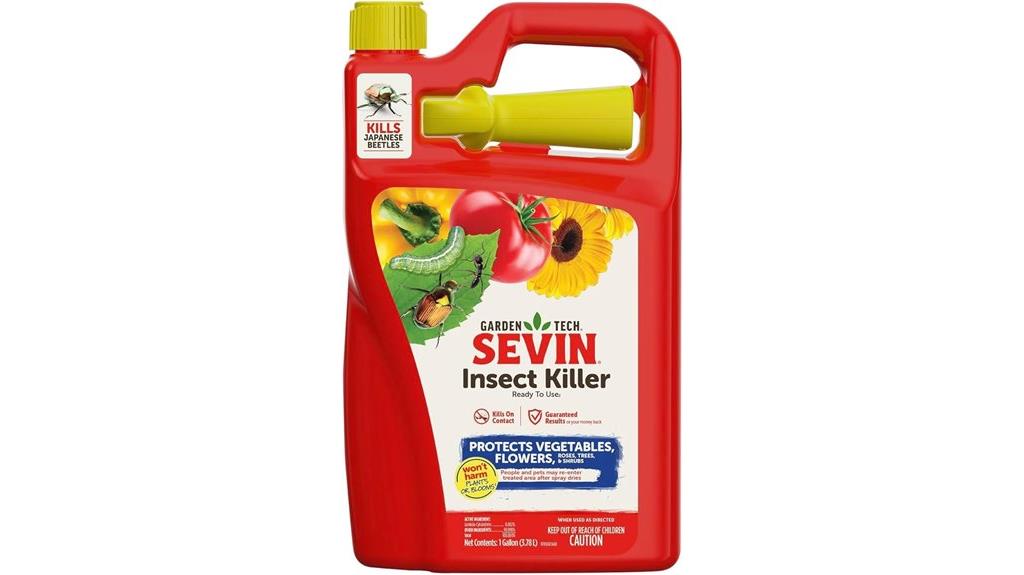
Sevin 100547234 Insect Killer Ready-to-Use is an excellent choice for gardeners who want fast, effective pest control without harming their plants. This 1-gallon spray targets over 700 insect pests on vegetables, flowers, roses, trees, and shrubs. It kills pests on contact and produces visible results within minutes. I appreciate how easy it is to use—just shake, adjust the nozzle, and spray from about a foot away, covering the targeted areas. It’s safe for plants, edibles, people, and pets once the dust settles, making it a reliable option for quick, broad-spectrum pest management in my garden.
Best For: gardeners seeking fast, effective, broad-spectrum insect control for vegetables, flowers, trees, and shrubs while ensuring safety for plants, pets, and people.
Pros:
- Kills over 700 insect pests on contact with visible results within minutes
- Safe for use around edibles, pets, and humans once dust has settled
- Easy to apply: shake, adjust nozzle, and spray from about a foot away
Cons:
- Some users report difficulties with sprayer assembly and proper nozzle adjustment
- Should be avoided on open blooms to protect pollinators
- Requires waiting at least 24 hours after application before watering plants
Garden Safe 32 oz. Insecticidal Soap Ready-to-Use, 1 Count (Pack of 1)

If you’re looking for an effective, ready-to-use pest control solution that’s safe for both your houseplants and your family, Garden Safe 32 oz. Insecticidal Soap is a great choice. It requires no mixing—just spray thoroughly on all plant parts, including the undersides of leaves, to target pests directly. Suitable for indoor, outdoor, and greenhouse environments, it’s safe for edible plants up to harvest day. It kills a wide range of pests like aphids, mites, whiteflies, and more quickly and effectively. Many users report no plant damage, making it a reliable, eco-friendly option for keeping your houseplants pest-free.
Best For: home gardeners, indoor plant enthusiasts, and organic gardeners seeking an easy, safe solution for pest control on a variety of plants, including edibles.
Pros:
- Ready-to-use spray requiring no mixing, making application quick and simple
- Safe for edible plants and suitable for use up to the day of harvest
- Effective against a wide range of pests with many users noting rapid results
Cons:
- May require multiple applications for tougher pests or severe infestations
- Some users experience dripping or uneven coverage, especially indoors, necessitating transfer to different sprayers
- Slightly higher cost compared to concentrated formulas that require dilution
NATRIA Insecticidal Soap, Ready-to-Use, 24 Oz
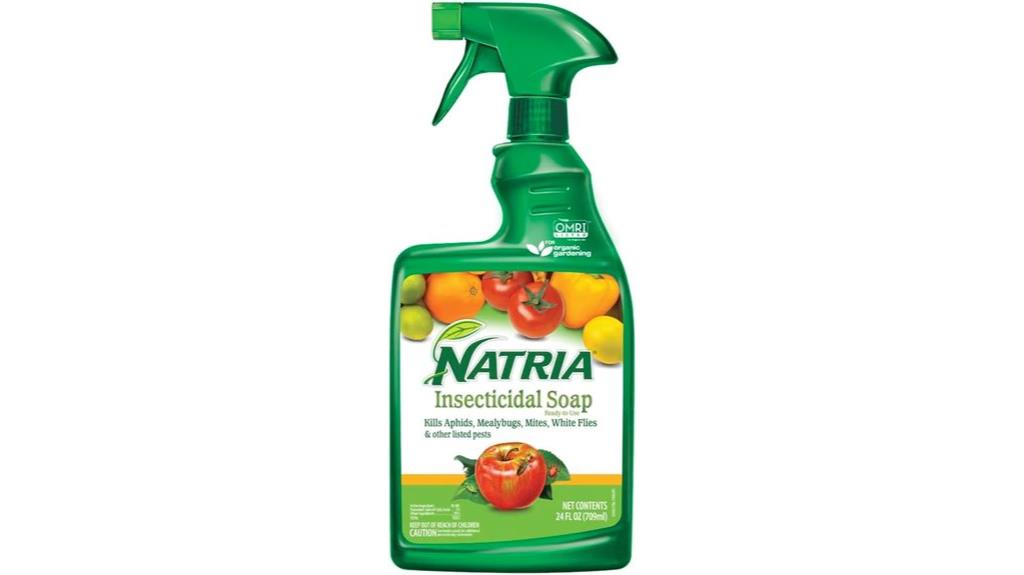
NATRIA Insecticidal Soap, Ready-to-Use, 24 Oz, stands out as an excellent choice for anyone seeking a safe, effective solution to pest problems on houseplants. This OMRI-listed spray quickly targets pests like aphids, mealybugs, mites, and whiteflies, showing visible results within minutes. It’s safe for indoor use, can be applied directly to foliage and soil, and is safe up to harvest day. The spray contains neem oil, making it eco-friendly and plant-safe when used as directed. Users appreciate its ease of use, real-time results, and ability to treat pests thoroughly, especially when combined with regular treatments.
Best For: home gardeners and plant enthusiasts seeking a safe, fast-acting solution to control pests on indoor and outdoor plants, including vegetables, houseplants, and ornamentals.
Pros:
- Fast-acting with visible pest control results within minutes
- OMRI-listed and contains neem oil, making it eco-friendly and safe for plants when used as directed
- Easy to apply with a ready-to-use spray bottle, suitable for both foliage and soil treatment
Cons:
- May require repeated applications for severe or persistent pest infestations
- Some users experience nozzle compatibility issues or limited long-term effectiveness
- Effectiveness can vary depending on pest type and severity, sometimes needing manual removal or additional treatments
Organic Fungicide Liquid Concentrate for Plants
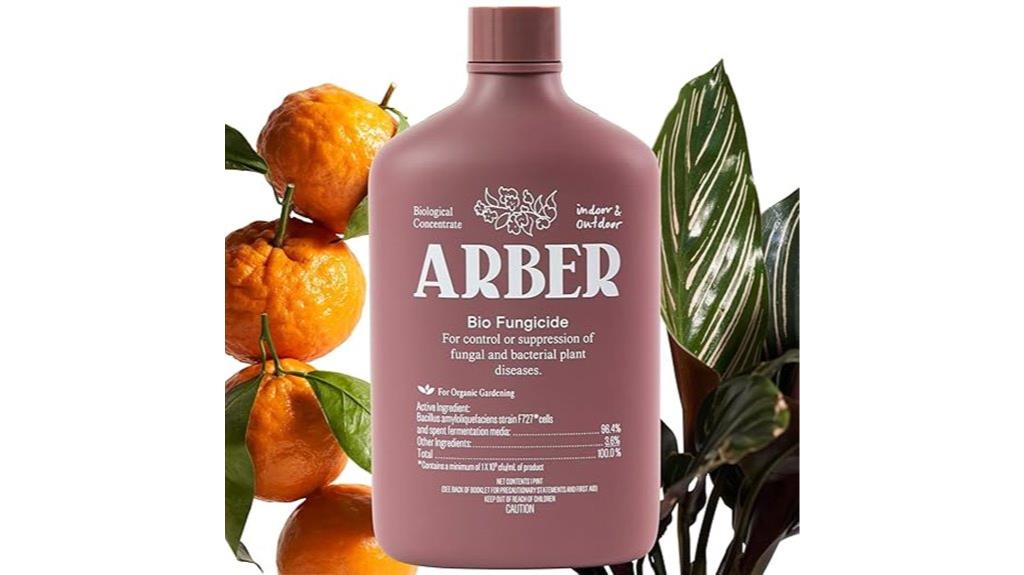
Organic Fungicide Liquid Concentrate is an ideal choice for gardeners and homeowners seeking a safe, eco-friendly way to protect their plants from fungal diseases. It effectively treats issues like powdery mildew, leaf spot, rust, and blight on houseplants, flowers, trees, vegetables, and lawns. It also helps control pests such as spider mites, aphids, and fungus gnats. Safe for children, pets, and pollinators, this concentrate is easy to mix and apply as a foliar or ground spray. Regular use prevents disease spread, promotes healthy growth, and keeps your plants thriving without harmful chemicals. It’s a versatile, natural solution for maintaining plant health indoors and outdoors.
Best For: Home gardeners, homeowners, and outdoor enthusiasts seeking a safe, eco-friendly solution to protect their plants from fungal diseases and pests.
Pros:
- Effective against a wide range of fungal diseases and pests, including powdery mildew, leaf spot, rust, blight, and soil-borne issues.
- Safe for children, pets, and pollinators, making it an environmentally friendly choice.
- Easy to mix and apply as a foliar or ground spray, suitable for indoor and outdoor use.
Cons:
- May not be effective against spider mites, which some users have noted.
- Requires regular application during active outbreaks for best results.
- Effectiveness can vary depending on pest type and severity of the issue.
Garden Safe 32 oz. Insecticidal Soap Ready-to-Use, 1 Count (Pack of 1)
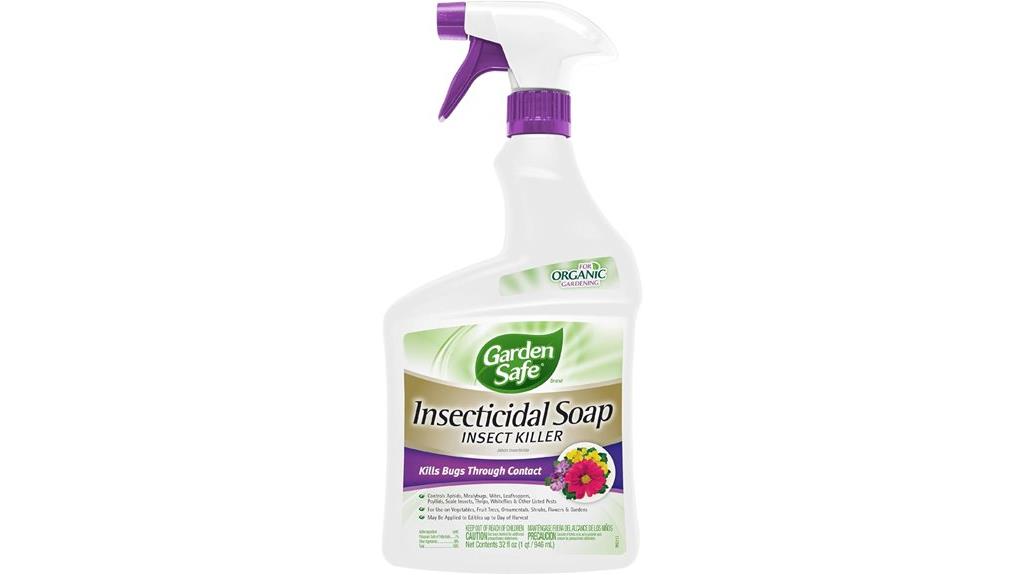
Garden Safe 32 oz. Insecticidal Soap Ready-to-Use is a convenient, no-mix spray perfect for combating pests on houseplants. Just shake and spray thoroughly on all plant parts, including undersides of leaves, for quick pest control. It works effectively on aphids, mites, whiteflies, and more, and is safe for edible plants, even up to harvest day. The formula contains fatty acid salts that kill pests on contact while being gentle on plants. With over 10,500 reviews and a 4.4-star rating, users praise its quick action and ease of use. It’s an affordable, reliable solution for organic pest management in indoor and outdoor settings.
Best For: gardeners and plant enthusiasts seeking an effective, safe, and easy-to-use insect control solution for both indoor and outdoor plants, including edible varieties.
Pros:
- Quick and effective contact pest control for a variety of pests including aphids, mites, and whiteflies
- Safe for edible plants, allowing application up to harvest day
- No mixing required, convenient spray for easy application on all plant parts
Cons:
- May require multiple applications for persistent or tougher pests
- Some users find it easier to transfer to different sprayers to prevent dripping during indoor use
- Effectiveness can vary depending on pest type and infestation severity
Bonide Insecticidal Soap, 32 oz Ready-to-Use Spray
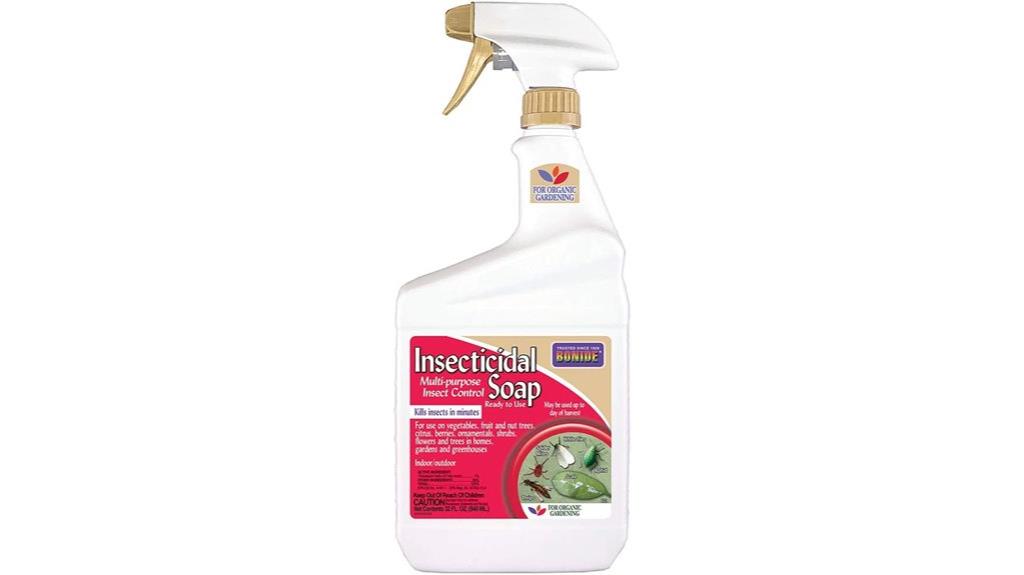
Bonide Insecticidal Soap, 32 oz Ready-to-Use Spray, is an excellent choice for homeowners seeking a simple, effective solution to control pests on their houseplants. This ready-to-use spray targets a wide range of pests, including aphids, spider mites, thrips, and more, through contact and ingestion. Its organic-approved formula makes it perfect for eco-conscious gardeners. The spray’s easy application allows you to target pests directly or let leaf-feeding insects ingest the soap. With a broad pest control spectrum and user-friendly design, Bonide Insecticidal Soap helps keep your houseplants healthy and pest-free without synthetic chemicals.
Best For: homeowners and organic gardeners seeking an easy, chemical-free way to control pests on houseplants and outdoor garden plants.
Pros:
- Effective against a wide range of pests including aphids, spider mites, and thrips
- Organic-approved formula suitable for eco-conscious gardening
- Ready-to-use spray with simple, direct application
Cons:
- May require multiple applications for severe infestations
- Less effective against pests hidden deep within plant tissue
- Can cause leaf damage if over-applied or used in direct sunlight
NATRIA Insecticidal Soap, Ready-to-Use, 24 Oz

If you’re looking for a safe and effective way to control pests on your houseplants, NATRIA Insecticidal Soap in the ready-to-use 24 oz size is an excellent choice. This OMRI-listed spray targets pests like aphids, mealybugs, mites, and whiteflies, working quickly to show results within minutes. It’s safe for indoor and outdoor use, and you can apply it on foliage and soil, even up to harvest day. I like that it’s easy to use — just spray, wipe leaves if needed, and repeat every two weeks for stubborn pests. Plus, it’s plant-friendly, odorless, and manufactured in the USA.
Best For: home gardeners and indoor plant enthusiasts seeking a safe, effective, and easy-to-use pest control solution for houseplants and outdoor garden plants.
Pros:
- Fast-acting with visible results within minutes
- OMRI-listed and safe for use up to harvest day
- Odorless, plant-friendly, and easy to apply with ready-to-use spray bottle
Cons:
- May require repeated applications for severe infestations
- Some users experience nozzle issues or limited long-term effectiveness
- Needs to be sprayed regularly every two weeks for best results
Bonide Captain Jacks Insecticidal Super Soap, 32 oz
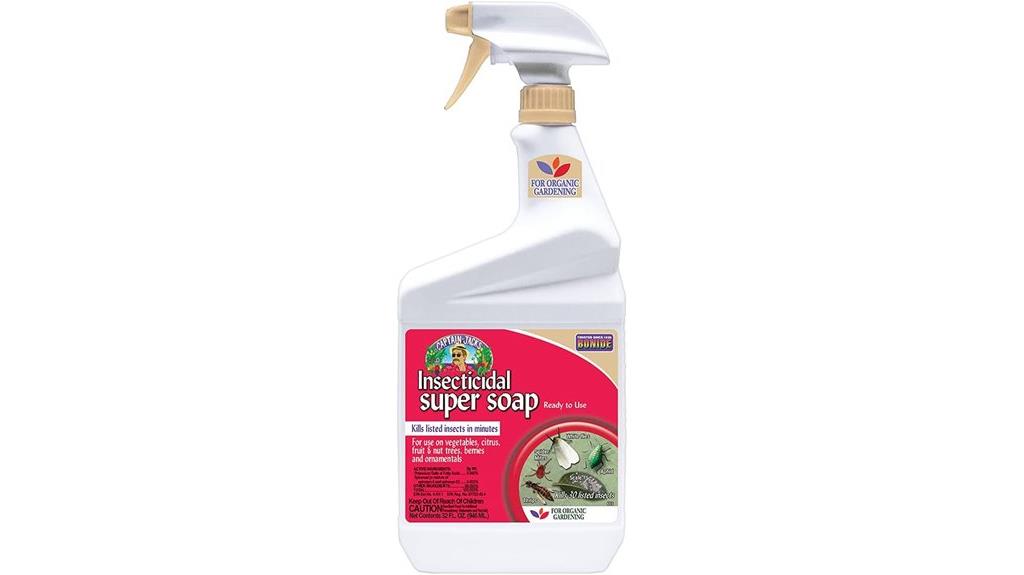
When searching for an effective, organic pest control solution for outdoor plants, Bonide Captain Jacks Insecticidal Super Soap stands out as a versatile choice. This ready-to-use spray targets over 30 pests and mites, including aphids, spider mites, and caterpillars, by contact and ingestion. It’s safe for organic gardening and approved by the USDA, making it perfect for vegetables, herbs, fruits, and ornamentals. Its fast-acting formula contains fatty acids and spinosad, ensuring quick results without harsh chemicals. Easy to apply with a spray nozzle, it’s highly rated by users for its effectiveness, odorless nature, and safety around humans and pets.
Best For: organic gardeners and homeowners seeking an effective, eco-friendly pest control solution for vegetables, herbs, fruits, ornamentals, and greenhouse plants.
Pros:
- Fast-acting and broad-spectrum, killing over 30 pests and mites through contact and ingestion
- Certified USDA organic, safe for humans, pets, and the environment
- Easy to apply with a ready-to-use spray nozzle, odorless, and suitable for a variety of outdoor plants
Cons:
- May require reapplication in heavily infested areas
- Not suitable for internal pest issues or pests hidden inside plant tissues
- Limited to outdoor and greenhouse use, not intended for indoor pest control
Natria Neem Oil Spray for Plants (24 Ounce)
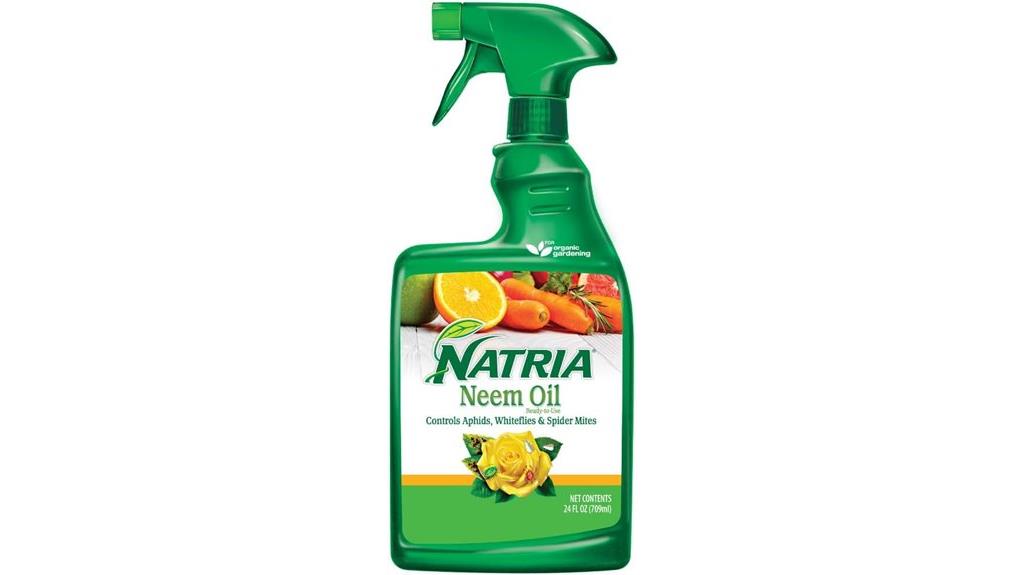
Natria Neem Oil Spray for Plants (24 ounces) is an excellent choice for gardeners seeking a natural, organic solution to pest and disease problems on their houseplants and outdoor gardens. It’s a ready-to-use spray that effectively targets pests like aphids, whiteflies, spider mites, and beetles, while also helping control diseases such as powdery mildew, blackspot, and rust. Suitable for plants bearing fruits, vegetables, delicate flowers, and ornamental shrubs, it can be applied at the first sign of trouble or as a preventive measure. Though it has a strong odor, it quickly fades, and users appreciate its ease of use and reliable pest control.
Best For: Gardeners and plant enthusiasts seeking an organic, easy-to-use pest and disease control solution for both indoor and outdoor plants, including vegetables, fruits, flowers, and ornamental shrubs.
Pros:
- Organic and ready-to-use, making application simple and convenient
- Effectively eliminates a wide range of pests like aphids, whiteflies, and spider mites
- Helps control common plant diseases such as powdery mildew and blackspot, promoting healthy growth
Cons:
- Has a strong odor that may be unpleasant, though it dissipates quickly
- Requires precautions like wearing masks and gloves due to potential toxicity during application
- Needs to be reapplied periodically for ongoing pest and disease management
Garden Safe Insecticidal Soap, Ready-To-Use (2 Pack)

For anyone seeking a convenient, ready-to-use solution for pest control on houseplants, the Garden Safe Insecticidal Soap, 2 Pack, offers a practical choice. This 32-ounce spray is suitable for organic gardening and can be used up to the day of harvest, making it perfect for edible plants. It effectively kills pests like aphids, mealybugs, mites, whiteflies, and more through contact. Simply spray all plant parts, including undersides of leaves, for thorough coverage. The product is safe for indoor, outdoor, and greenhouse use, but remember to dispose of the container properly after use. It’s a reliable, immediate option to keep your plants pest-free.
Best For: home gardeners and plant enthusiasts seeking an effective, organic-approved insect control solution for indoor, outdoor, and edible plants.
Pros:
- Ready-to-use 32-ounce spray for quick application
- Suitable for organic gardening and safe to use up to the day of harvest
- Effective against a wide range of common pests through contact
Cons:
- Contains a non-refillable container, limiting reuse options
- Requires thorough coverage, including undersides of leaves, for best results
- Not intended for use on plants that may be sensitive to soap-based solutions
Bonide Systemic Houseplant Insect Control (8 oz)
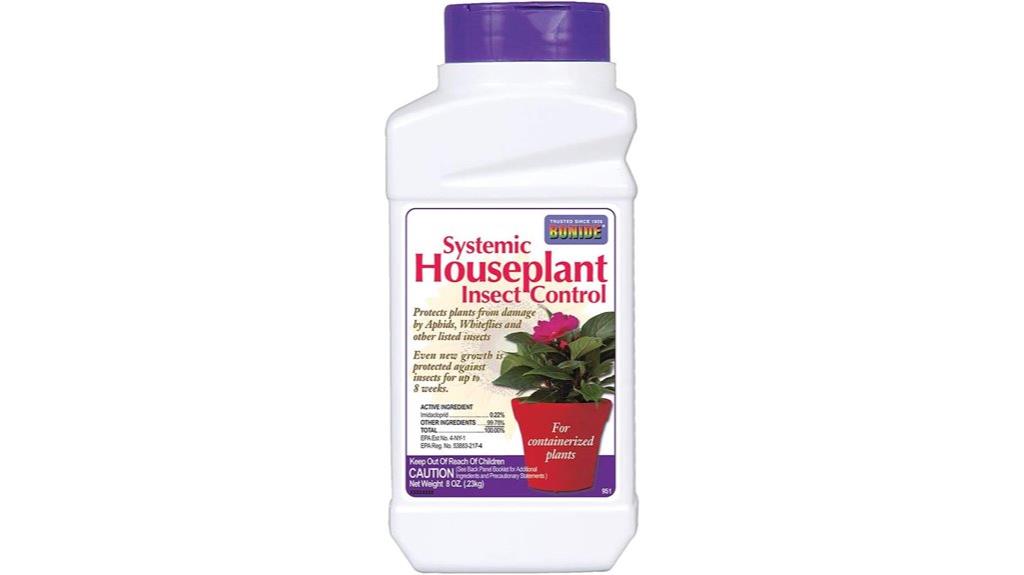
Looking for an effective insect control solution that works deep within your houseplants? Bonide Systemic Houseplant Insect Control is a ready-to-use granular treatment that provides up to 8 weeks of protection. It absorbs into the plant roots and circulates through the tissue, targeting pests like aphids, whiteflies, and mealybugs. To apply, simply sprinkle the granules on the soil, water thoroughly, and reapply every two months. It’s especially effective against soil-borne insects and pests that feed on plant sap. While not suitable for edible plants, many users find it highly effective at controlling pests and preventing infestations in houseplants like monstera and ponytail palms.
Best For: indoor houseplant enthusiasts seeking a long-lasting, systemic insect control solution for pests like aphids, whiteflies, and mealybugs on containerized plants.
Pros:
- Provides up to 8 weeks of protection with a single application
- Absorbs into plant roots and circulates through tissue for effective pest control
- Easy to apply by sprinkling granules on soil and watering
Cons:
- Not suitable for edible herbs, vegetables, or fruit-bearing plants
- Container appears less than half full due to settling, which may be misleading for some buyers
- Slightly small size for the price compared to similar products
BAYER CROP SCIENCE 701290B 3 In 1 Mite Control, 24-Ounce

If you’re seeking a reliable solution to protect your garden plants from multiple pests and diseases, Bayer Crop Science’s 3-in-1 Mite Control is an excellent choice. This 24-ounce formula offers broad-spectrum protection for roses, flowers, shrubs, and trees. It combines insect, disease, and mite control in one product, targeting pests like aphids, spider mites, armyworms, and Japanese beetles, while also fighting black spot and powdery mildew. The systemic rainproof protection lasts up to 30 days, covering up to 45 plants per application. Keep in mind, it’s not available in some states like New York and Colorado.
Best For: Gardeners and landscapers seeking an all-in-one solution to protect roses, flowers, shrubs, and trees from pests and diseases with long-lasting, rainproof coverage.
Pros:
- Combines insect, disease, and mite control in one easy-to-use formula
- Provides systemic rainproof protection for up to 30 days
- Treats up to 45 plants per application, suitable for large gardens and landscapes
Cons:
- Not available for purchase in New York, Connecticut, Colorado, Maryland, and Vermont
- May require multiple applications for extended protection beyond 30 days
- Should be used carefully to avoid harming beneficial insects or surrounding wildlife
Bonide Captain Jacks Mite-X for Houseplants, 12 oz Spray
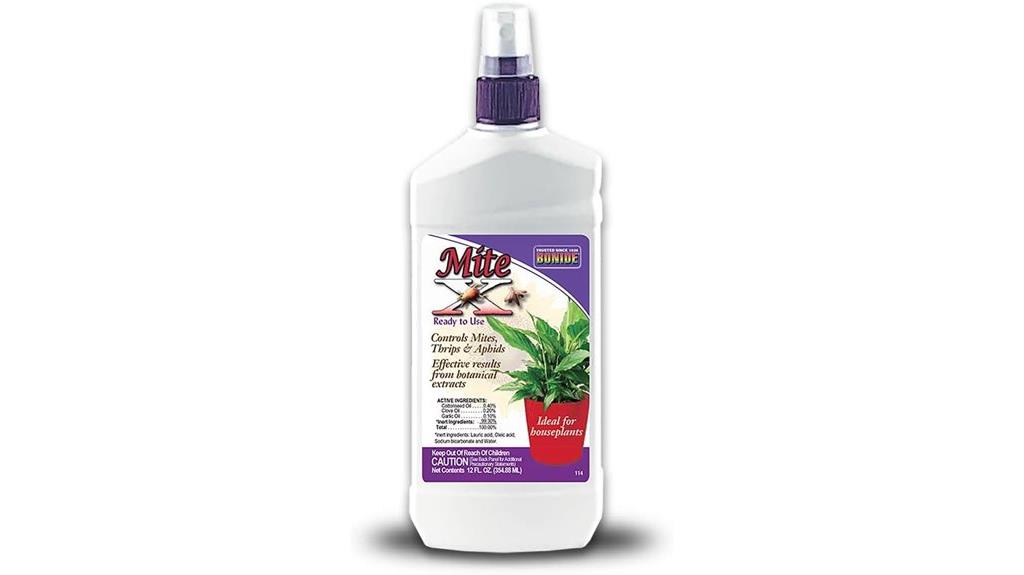
Bonide Captain Jacks Mite-X for Houseplants stands out as an excellent choice for anyone seeking a natural, contact-based insecticide to protect their indoor and outdoor plants. This ready-to-use spray features botanical extracts like cottonseed, clove, and garlic oils, making it a safe, non-toxic option. It effectively targets pests such as mites, thrips, and aphids, killing them on contact. I’ve found it works best with repeated applications, especially against stubborn infestations. Its mild garlic scent dissipates quickly, and it’s safe for use in confined spaces. Overall, it’s a natural, effective solution that keeps my plants healthy without harsh chemicals.
Best For: home gardeners and indoor plant enthusiasts seeking a natural, safe, and effective pest control solution for mites, thrips, and aphids on their plants.
Pros:
- Made with botanical extracts like cottonseed, clove, and garlic oils, offering a natural alternative to chemical pesticides
- Kills pests on contact while being safe for indoor use and non-toxic to plants
- Has a mild garlic scent that dissipates quickly, making it suitable for scent-sensitive environments
Cons:
- Requires multiple applications for stubborn infestations such as spider mites
- Some users have experienced spray bottle malfunction or difficulty in application
- Not recommended for flowering cannabis plants due to potential aroma transfer
Earths Ally 3-in-1 Plant Spray (32 oz)
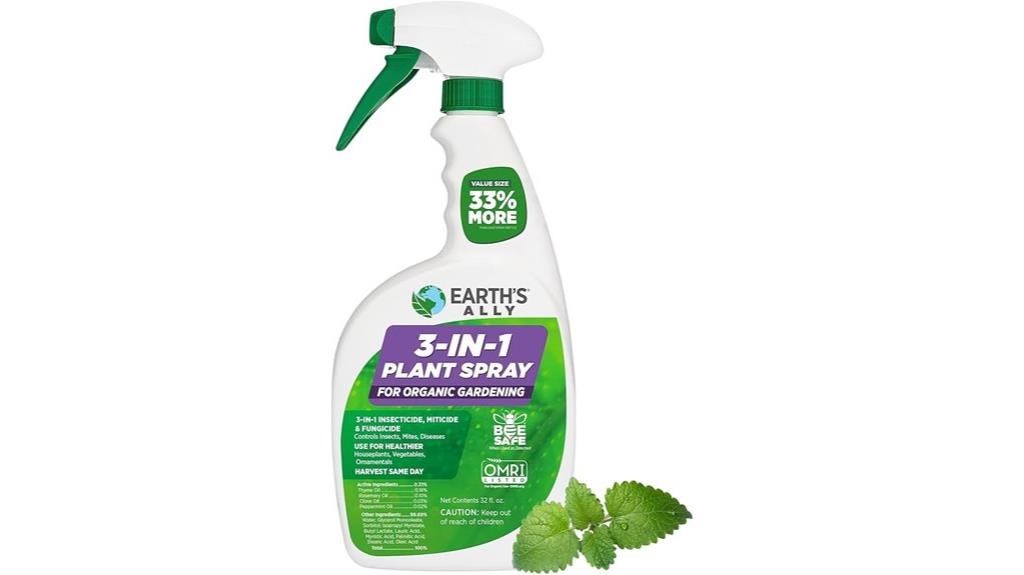
Earth’s Ally 3-in-1 Plant Spray (32 oz) is an ideal choice for gardeners seeking a safe, organic solution to protect their indoor and outdoor plants from pests and diseases. This versatile spray acts as an insecticide, miticide, and fungicide, effectively tackling pests like spider mites, aphids, and whiteflies, while managing diseases such as powdery mildew and leaf spot. Made from botanical oils like thyme, rosemary, clove, and peppermint, it’s a natural alternative to chemicals. OMRI listed and bee-safe, it’s suitable for organic gardens and safe around pollinators. I’ve found it easy to use, though multiple applications may be needed for full results.
Best For: gardeners seeking a safe, organic solution to protect their indoor and outdoor plants from pests and diseases.
Pros:
- Made from natural botanical oils, ensuring a chemical-free, organic option.
- OMRI listed and bee-safe, suitable for organic gardening and pollinator protection.
- Versatile, acting as an insecticide, miticide, and fungicide for comprehensive plant care.
Cons:
- May require multiple applications for full effectiveness.
- Effectiveness can vary depending on plant type and pest or disease severity.
- Some users have experienced plant stress or leaf burn if applied improperly or under unsuitable conditions.
Safer 5118-6 Insecticidal Soap for Plants
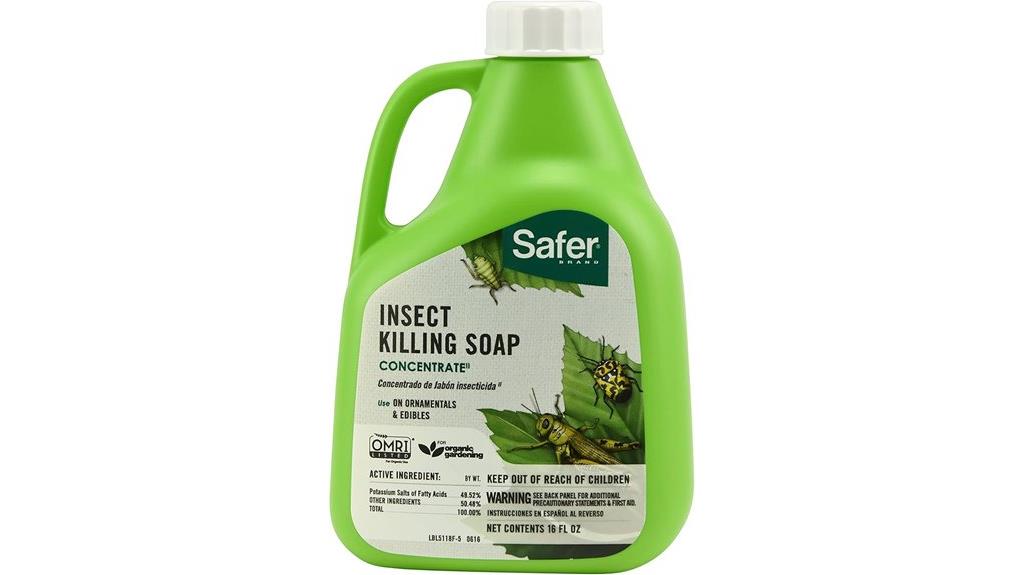
Safer 5118-6 Insecticidal Soap for Plants stands out as an ideal choice for gardeners seeking an organic and environmentally friendly solution to pest problems on houseplants. It’s OMRI Listed, so it’s safe for organic gardening and breaks down naturally within 7-10 days. This soap effectively targets soft-bodied pests like aphids, whiteflies, spider mites, and mealybugs by dehydrating them through contact. I appreciate how easy it is to use—just spray thoroughly, especially on the undersides of leaves, every week or so. Its concentrated formula makes up to six gallons, offering economical pest control without harming beneficial insects or the environment.
Best For: organic gardeners and plant enthusiasts seeking a safe, natural solution to control soft-bodied pests on houseplants, flowers, herbs, vegetables, trees, and shrubs.
Pros:
- OMRI Listed and compliant with organic standards, ensuring eco-friendly use.
- Breaks down naturally within 7-10 days, minimizing environmental impact.
- Easy to apply, especially on underside of leaves, with visible results often within days.
Cons:
- May require multiple applications during heavy infestations or after rain.
- Concentrate can solidify upon arrival, needing warming before use.
- Strong odor and small bottle size may be inconvenient for some users.
Factors to Consider When Choosing Insecticidal Soap for Houseplants
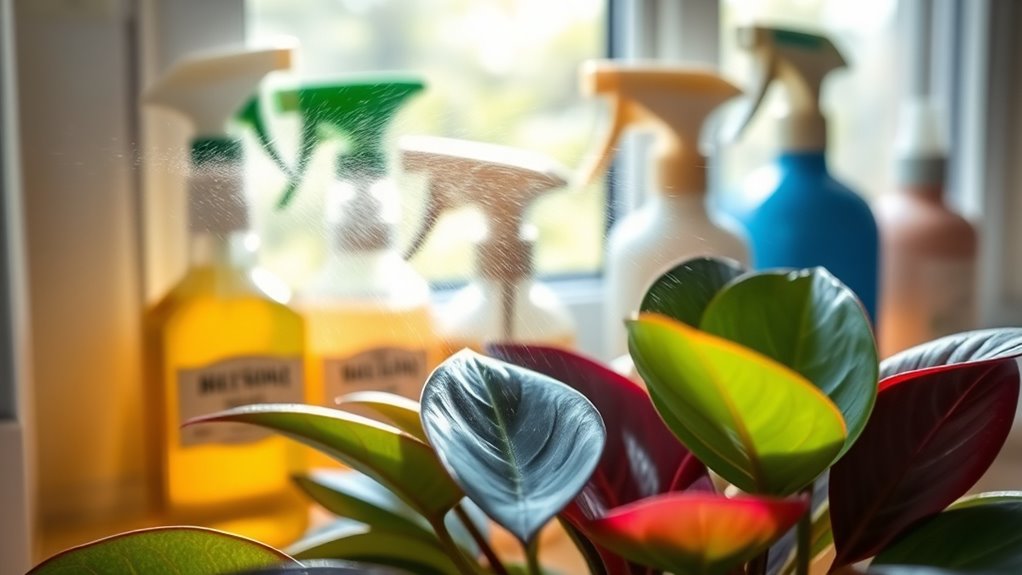
When selecting an insecticidal soap for your houseplants, I consider several key factors. I look at how broad the pest coverage is, whether it’s safe for edible plants, and if it’s certified organic. Understanding application methods and plant compatibility helps me choose the most effective and safe option for my plants.
Pest Spectrum Coverage
Have you ever wondered if insecticidal soap will target all the pests bothering your houseplants? Most soaps work best against soft-bodied pests like aphids, whiteflies, mealybugs, and spider mites. They aren’t as effective against hard-bodied insects such as beetles or caterpillars, which often need different treatments. The pest coverage can vary depending on the product formulation—some include ingredients that help fight fungal issues like powdery mildew. Keep in mind, a single application rarely does the job; repeated treatments are usually necessary, especially with heavy infestations or resistant pests. To maximize effectiveness, make sure to thoroughly cover all plant surfaces, including undersides of leaves and tricky crevices, where pests often hide. Proper coverage is key to broad pest control.
Safety for Edibles
Choosing the right insecticidal soap for your houseplants involves considering whether it’s safe for edible plants, especially if you plan to harvest leaves or fruits soon. So, I look for soaps labeled as safe for edibles, which can be used up to the day of harvest without risking contamination. These products often contain fatty acid salts or neem oil, which are generally non-toxic when used correctly. Always check the label for specific instructions on application timing and harvest intervals to ensure safety. Proper coverage is key—thoroughly spray all plant surfaces, including undersides of leaves. While organic and OMRI-listed soaps are designed to be safe for edibles, overapplication or misuse can pose risks, so I follow the guidelines carefully.
Organic Certification Status
Opting for insecticidal soap with organic certification guarantees you’re using a product that meets strict standards for environmental safety and health. Certification indicates that the soap is produced without synthetic chemicals or harmful additives, ensuring a safer choice for your plants and the environment. A widely recognized certification, like that from the Organic Materials Review Institute (OMRI), verifies a product’s compliance with organic standards. These certified soaps usually contain natural ingredients such as fatty acids or neem oil and exclude synthetic pesticides or preservatives. Verifying a product’s organic certification helps you ensure that your pest control methods are sustainable and health-conscious, aligning with organic gardening principles. This peace of mind allows you to protect your houseplants effectively without compromising environmental or personal well-being.
Application Methods
Selecting the right application method is essential for maximizing the effectiveness of insecticidal soap on your houseplants. I recommend thoroughly spraying all plant surfaces, including undersides of leaves, to ensure pests come into contact with the soap. You can use a foliar spray for visible infestations or a soil drench if pests are hiding in the soil. Proper coverage is key, and repeating treatments may be necessary for stubborn pests. Always apply during cooler parts of the day, like early morning or late afternoon, to prevent leaf burn. Adjust your nozzle to switch between spray and stream modes, targeting pests precisely while reducing waste. Consistent, careful application improves the soap’s effectiveness and keeps your houseplants healthy.
Plant Compatibility
How do you guarantee that insecticidal soap won’t harm your houseplants? First, check that the product is labeled as safe for indoor use. Look at the active ingredients—soaps with fatty acids or neem oil tend to be gentler on delicate plants. It’s also important to verify that the soap is suitable for your specific plant species, as some plants are more sensitive to certain ingredients. Consider choosing OMRI-listed or organic-certified options to ensure the soap is gentle and safe indoors. Finally, pay attention to the concentration and formulation; over-application can cause leaf burn or stress, especially in sensitive plants. Taking these steps helps protect your houseplants while effectively managing pests.
Environmental Impact
When choosing insecticidal soap for your houseplants, considering its environmental impact is essential to protect beneficial insects and promote sustainability. These soaps break down quickly, usually within 7-10 days, reducing long-term ecological effects. Made from natural fatty acids and salts, they’re biodegradable and safe for pollinators when used correctly. Proper application is key—avoid spraying during peak activity times for pollinators and don’t overuse. OMRI-listed soaps meet organic standards, ensuring environmentally friendly ingredients. Using insecticidal soap responsibly by following recommended dosage and timing helps minimize unintended harm to non-target organisms. Overall, when used thoughtfully, insecticidal soaps are an eco-friendly pest control option that supports both plant health and environmental well-being.
Frequency of Use
The frequency with which you apply insecticidal soap depends largely on the severity of your houseplant’s pest problem. For active infestations, I recommend treating every 5 to 7 days until you see improvement. Persistent pests like mites or scale insects often require repeated treatments, sometimes weekly, to fully control them. For ongoing protection, reapplying every two weeks is generally effective, but some pests may need more frequent applications at first. It’s essential not to overuse the soap, as excessive treatments can stress or damage your plants. I always monitor my plants’ response and adjust the schedule accordingly. Be sure to follow your product’s instructions regarding reapplication intervals to balance pest control and plant safety effectively.
Price and Value
Choosing an insecticidal soap that fits your budget involves more than just looking at the sticker price. The cost varies with concentration, size, and brand, which affects the overall value. Concentrated formulas can be more economical because they offer more coverage per dollar, but they require dilution, adding a step. Reapplication frequency also impacts cost—products needing frequent treatments can add up. To truly compare value, check the price per ounce or gallon; this helps you see which product offers the best pest control for the cost. Remember, quality and effectiveness matter too. A slightly higher-priced soap that works quickly and lasts longer can save you money and effort in the long run, making it a smarter investment for healthy houseplants.
Frequently Asked Questions
Are Insecticidal Soaps Safe for All Houseplant Species?
When considering if insecticidal soaps are safe for all houseplants, I’d say it’s generally true but with exceptions. Most houseplants tolerate these soaps, but some sensitive varieties like ferns or succulents may react poorly or get damaged if the soap concentration is too high or applied too often. I always test a small area first and follow the instructions carefully to avoid harming my plants.
How Often Should I Apply Insecticidal Soap to Houseplants?
Imagine your houseplants as delicate dancers needing just the right rhythm. I usually apply insecticidal soap every 7 to 10 days, giving pests a gentle but firm reminder to leave. I keep a close eye on my plants, and if pests persist, I might repeat sooner. Always follow the product instructions and test on a small area first. Consistency is key to keeping your green friends healthy and pest-free.
Can Insecticidal Soaps Be Used Preventively on Houseplants?
Yes, I think insecticidal soaps can be used preventively on houseplants. I spray them every few weeks, especially when I notice pests or during active growing seasons. This helps keep bugs at bay before they cause serious damage. Just make sure to follow the instructions on the label, and avoid applying during direct sunlight or when plants are stressed. Prevention is key to keeping my houseplants healthy!
Do Insecticidal Soaps Leave Any Residue on Houseplants?
You’re wondering if insecticidal soaps leave residue on houseplants. I’ve used them myself, and I can tell you they usually rinse off easily with water, leaving minimal residue. Unlike chemical pesticides, they’re gentle and don’t build up over time. Just make sure to wash your plants thoroughly after treatment, especially if you notice any soap film, so your plants stay healthy and residue-free.
Are There Any Plants or Environments Where Insecticidal Soap Is Not Effective?
Think of insecticidal soap as a trusty knight, but even knights have their limits. I’ve found it’s less effective on plants with thick, waxy leaves or in humid environments where moisture shields pests. Certain succulents and cacti can shrug off the soap’s punch, and overly damp conditions dilute its power. So, while it’s a reliable tool, I always consider the plant’s nature and environment for best results.
Conclusion
Think of choosing an insecticidal soap like selecting a trusted shield for your garden’s castle. With the right pick, you’ll fend off pesky invaders and keep your houseplants thriving. Remember, not all shields are the same—some are stronger, some gentler. By choosing wisely, you’re arming yourself with a reliable defender that works as hard as you do. So, gear up and protect your green kingdom—your plants deserve nothing less!
